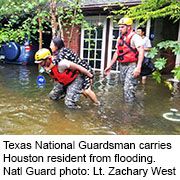- Could Your Grocery Store Meat Be Causing Recurring UTIs?
- Are You Making This Expensive Thermostat Error This Winter?
- Recognizing the Signs of Hypothyroidism
- 10 Strategies to Overcome Insomnia
- Could Artificial Sweeteners Be Aging the Brain Faster?
- Techniques for Soothing Your Nervous System
- Does the Water in Your House Smell Funny? Here’s Why
- Can a Daily Dose of Apple Cider Vinegar Actually Aid Weight Loss?
- 6 Health Beverages That Can Actually Spike Your Blood Sugar
- Treatment Options for Social Anxiety Disorder
Hurricanes May Have Longer-Lasting Impact on Kids

Children may have a more difficult time coping with the devastating hurricanes that have recently hit the United States, an expert says.
“Compared to adults, children suffer more from exposure to disasters, including psychological, behavioral, and physical problems, as well as difficulties learning in school,” Jessica Dym Bartlett, a senior research scientist at Child Trends, said in that organization’s news release.
Even youngsters who hear about a disaster or see images on television may develop symptoms of post-traumatic stress disorder, depression and anxiety, she said.
“Understand that trauma reactions vary widely. Children may regress, demand extra attention, and think about their own needs before those of others — natural responses that should not be met with anger or punishment,” Dym Bartlett said.
Create a safe environment where children’s basic needs — such as shelter, food and clothing — are met. Keep to regular schedules and other routines that provide children with a sense of safety and predictability.
It’s also important to keep children busy. Boredom can worsen negative thoughts and behaviors. Youngsters are less likely to feel distress if they play and interact with others, Dym Bartlett said.
Limit children’s exposure to images and descriptions of the disaster, talk with them about what they see and hear, and emphasize hope and positivity.
“Find age-appropriate ways for children to help. Even very young children benefit from being able to make a positive difference in others’ lives while learning important lessons about empathy, compassion, and gratitude,” Dym Bartlett said.
If a child continues to have difficulties longer than six weeks after a hurricane, seek professional help, the National Child Traumatic Stress Network recommends.
It’s also important for parents and other child caregivers to get the necessary attention, support and care that they need, Dym Bartlett said.
More information
The National Child Traumatic Stress Network has more on helping children cope with hurricanes.
Source: HealthDay
Copyright © 2026 HealthDay. All rights reserved.










